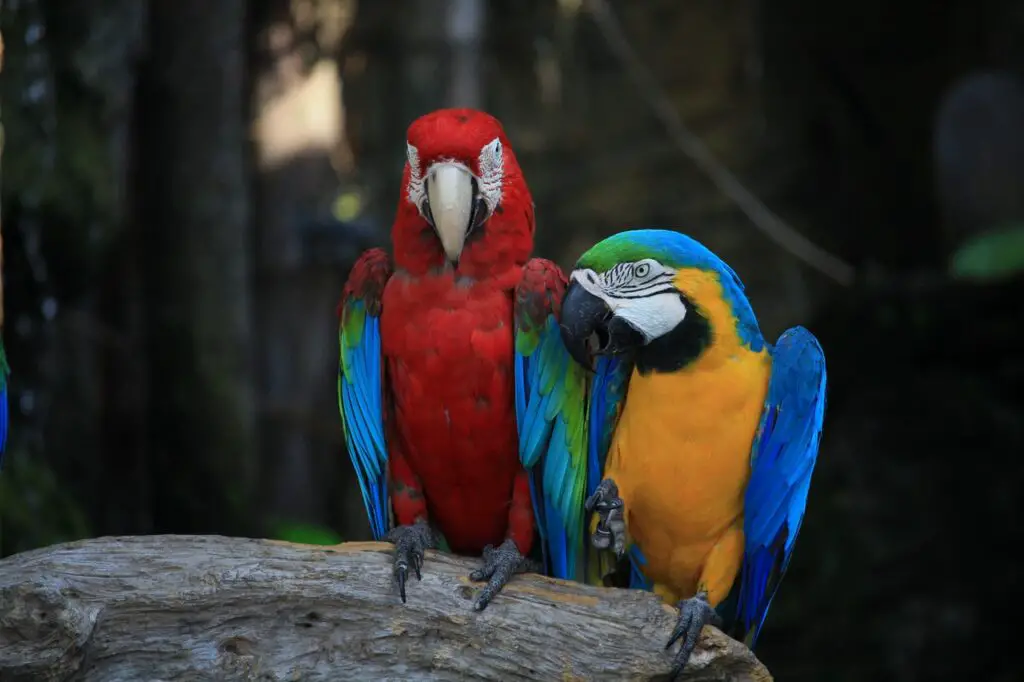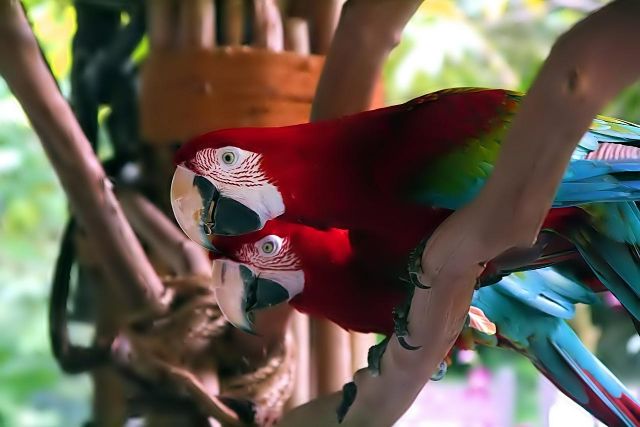If you’re considering adding a parrot to your family, you might wonder, ‘Can parrots be left alone?’ It’s an important question you should ask before bringing one into your home.
Parrots are social creatures known for their intelligence and require much interaction. They’re not like cats or dogs that can be left alone for long periods. Understanding the behavior of these vibrant animals and the importance of their social interaction is crucial. Also, knowing the potential risks of solitude and balancing your busy schedule with your pet’s needs is important.
This article provides tips on keeping your parrot engaged even when you’re away. So, whether you’re a seasoned bird lover or a beginner, this guide will help you make an informed decision and ensure your feathery friend is well cared for.
- Key Takeaways
- Understanding Bird Behavior
- The Importance of Social Interaction
- Potential Risks of Solitude
- Balancing Your Schedule and Your Pet's Needs
- Tips for Keeping Your Bird Engaged While You're Away
- Frequently Asked Questions
- What is the maximum time a parrot can be left alone safely?
- Are there specific breeds of parrots that are more tolerant of being alone?
- Can parrots suffer from emotional issues like depression or anxiety when left alone?
- How can I tell if my parrot is feeling lonely or neglected?
- What essential items should I provide for my parrot if I need to leave them alone for extended periods?
- Conclusion
Key Takeaways
- Parrots are social creatures and require a great deal of interaction.
- Solitude can lead to negative behaviors and stress in parrots.
- Providing a balanced diet and a cozy nest is essential for parrot well-being.
- Regular interaction, environmental enrichment, and mental stimulation can help parrots cope with solitude.

Understanding Bird Behavior
Please don’t underestimate the complexity of bird behavior, especially with parrots, as understanding their unique actions and needs can enrich your bond with them.
Bird communication is a fascinating aspect of their behavior. Parrots, known for their intelligence, use a variety of sounds, gestures, and body language to express their feelings. Feather plucking, for instance, could indicate stress or loneliness, so providing your feathered friend with enough interaction is crucial.
Parrot diets and nesting habits are essential to their well-being too. Provide a balanced diet and a cozy nest, which will help maintain their health and happiness.
Remember, your parrot relies on you for care, love, and companionship. So, never leave them alone for extended periods, as it can lead to negative behaviors.

The Importance of Social Interaction
Understanding that these vibrant creatures thrive on social interaction and can experience adverse effects if deprived of companionship is crucial. They have impressive emotional intelligence, longing for companionship and interaction necessities.
Bonding Benefits:
- Parrots form strong emotional bonds with their owners, much like a child would with a parent.
- This bond can bring joy and responsibility to your life, providing a unique companion dynamic.
Social Stimulation:
- Parrots need regular, engaging interactions to maintain their emotional health.
- Ignoring these needs can lead to behavior issues and depression in your feathered friend.
Nurturing the companion dynamic with your parrot through social stimulation and understanding their interaction necessities is beneficial for their well-being and a rewarding experience for you. Be their social pillar; they’ll reward you with a lifetime of love and companionship.
Potential Risks of Solitude
Imagine the emotional toll of solitude on your feathered friend, leading to serious health and behavioral issues.
Emotional distress is a significant risk, as parrots are sociable creatures who thrive on interaction. The health implications of loneliness can be severe, with your parrot potentially developing destructive solitude-induced behaviors like feather plucking or self-harming.
Unattended hazards also increase when a parrot is left alone. Items in your home could pose a risk if your parrot gets bored or anxious and starts to explore.
The key to mitigating these risks is stress management. Regular interaction, environmental enrichment, and mental stimulation can help your parrot cope with periods of solitude. Remember, your parrot’s well-being is your responsibility.
Balancing Your Schedule and Your Pet’s Needs
Striking the right balance between your busy lifestyle and your feathered companion’s needs is crucial to ensure their overall well-being. Understanding and accommodating their feeding schedules, cage positioning, and noise considerations are key to maintaining a healthy environment.
Ideally, your parrot should have a consistent feeding schedule, which can be challenging if you’re often away. Hiring a reliable pet sitter might be a good solution.
As for cage positioning, ensure it’s in a quiet, secure place but not entirely isolated. Parrots are social creatures, and they need stimulation.
Lastly, creating routines can help your parrot feel secure. Regular feeding times, play sessions, and quiet times can make a difference. Remember, your dedication to balancing your schedule with your parrot’s needs can significantly impact their happiness and health.
Tips for Keeping Your Bird Engaged While You’re Away
Even when you’re not around, there are plenty of ways to keep your feathered friend entertained and mentally stimulated.
Interactive toys are a must-have; they can provide hours of fun and mental exercise, while a smart cage setup with various levels and perches allows for physical activity.
But it’s not just about physical engagement. Consider providing audio stimulation, such as leaving a radio on. The sounds can help mimic the busy atmosphere of a wild bird’s habitat.
You can also hide nutritious treats in the cage, ensuring your parrot remains healthy while having fun. Place the cage near a window for scenic views, giving your bird a sense of the great outdoors.
Remember, a happy parrot is an engaged parrot, even when you’re away!
Frequently Asked Questions
Conclusion
In conclusion, you shouldn’t leave your parrot alone for too long. They crave social interaction, and solitude can harm them.
It’s vital to balance your schedule to meet their needs. When you’re away, find ways to keep your feathery friend engaged. They’re not just pets. They’re companions needing your attention and companionship.
Remember, a happy parrot is a healthy parrot whose well-being is in your hands.
